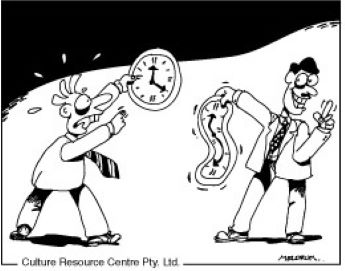Blog Culture@Work
Welcome! My name is Joost Thissen and here I like to share cultural columns and insights for those of us who are interested in culturally diverse and global workplaces.


Welcome! My name is Joost Thissen and here I like to share cultural columns and insights for those of us who are interested in culturally diverse and global workplaces.


cultural column  Email This Post
Email This Post
When working with people from other cultures, we often encounter the fact that different cultures seem to have different approaches to the concept of time.
An interesting example comes from one of our clients in the finance industry: in an Indian subsidiary of an Australian company, one of the employees was rather upset by a complaint from an Australian client about not returning a promised call. According to the Indian employee: “It is very difficult to understand why a customer is mad at me when I haven’t called back – I was actually working on his problem and I thought it would be better to call back when I had solved the problem. So what if it is a bit later than agreed? I thought he would be more upset if I called and told him that I didn’t have an answer yet”.
In this example, for the Indian person, time is not as important as the result: the finished work was the priority for the Indian. No news is not always bad news. In India, Indian Standard Time (IST) is sometimes jokingly referred to by Indians themselves as Indian Stretchable Time.
‘Wasting time’ for Indonesians is an almost meaningless concept. Time here is seen as a gentle river carrying everything along: little effort is made to ‘manage’ the flow. Indonesians might explain that they live in jam karet or translated from Bahasa in English: ‘rubber time’. Appointments when made, are vague, provisional indications of intention. The norm is harmonious interaction with other people in a flexible, spontaneous, unstructured context. Throughout the world we find names like Rubber time, Island time, or Elastic time which are different names for a similar flexible approach to the use of time.
Cultures who prefer a more flexible approach to time regard time as cyclical – there seems to be focus on human interaction, relationships and a more holistic approach to interaction. Interpersonal skills are strongly valued and highly developed. Let’s refer to these cultures as ‘stretchable time cultures’.
In many Western cultures such as Australia, the USA, the UK and some of the Nordic European cultures, time is a much more rigid concept. In these cultures, time is precious and it should not be wasted. People maintain calendars, carry agendas and make schedules to manage their time. Appointments are taken seriously, and promptness is seen as both a virtue and sign of respect. Responsiveness and to say that ‘although you have not solved a problem as yet, you are working on the problem’ is highly appreciated. Accomplishments are often measured by how well the selected time frames are met. The English language is full of sayings urging us to use time wisely: ‘time is money’, ‘time is of the essence’ and ‘don’t waste my time’. Benjamin Franklin, one of the Founding Fathers of the USA stated that ‘Lost time is never found again’. Cultures who prefer a more punctual approach to time also regard time as linear.
In many Western cultures there seems to be a focus on task orientation and being able to manage and structure separate schedules and time frames. Let’s refer to these as ‘rigid time cultures’.
The way we perceive time is part of our cultural programming; it shows us was is normal and expected in our own culture, it makes us feel comfortable and helps us understand what is going on. Dealing with people who have a preference for the ‘other’ approach to time can make us feel uneasy and frustrated. Some cultures might think that arriving late for meetings and missing important deadlines is not a professional way of doing business… We often seem to judge the ‘other’ culture with our own preferences in mind and think that ‘our way’ is the right and better way.
Applying Multiple Perspectives
An interesting example of multiple perspective taking comes from an American expatriate client who lived for many years in Indonesia. He commented: “We might think that with schedules we can control the future, but instead we often find that we have become prisoners of our schedules. We are compulsive about filling blocks of time with useful activity and hurry from appointment to appointment. We are frustrated when a task takes longer than the time we had planned. We interrupt work we have almost finished and stop activities we’re enjoying because we’re ‘running behind schedule’. This can become stressful and frustrating, seeing reality as a series of segmented time compartments can blind us to the wholeness of life”. This person reflected on the orientation that his own country culture seem to live by, but only after actually experiencing the other perspective he was being able to critically consider the impact of both orientations.
Hinglish
By the way, did you know that in Hinglish (i.e. Indian or Hindu English) to ‘pre-pone’ a meeting is a commonly used expression? Perhaps ‘stretchable time’ means that some tasks take more time and other tasks take considerably less time compared to ‘rigid’ time cultures. Just think about an elastic band: once stretched it also ‘shrinks’ again, therefore if you post-pone a meeting you can also ‘pre-pone’ a meeting. Try to find one word in English that matches ‘pre-pone’… Maybe it could add a little something when striving for efficiency.
So how might we interpret the concept of time in our fast growing global business world? We could ask ourselves if the interference of a ‘rigid’ time culture upon e.g. Indian or Indonesian processes might actually be counter-productive to their work? Cultural differences often complicate preferred ways of working with each other and different approaches to time orientation are no exception. Clearly communicating practices and expectations is key to managing outcomes from both perspectives.
_________________________________________
Joost Thissen, Partner & Interculturalist
joost@cultureresourcecentre.com.au
cultural column  Email This Post
Email This Post